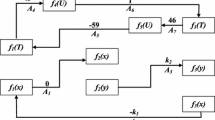Abstract
This paper presents a framework appropriate for Flexible Real-Time Systems (FRTS) and a run-time support system based on that framework, called Flexible Real-Time Linux (FRTL). The framework proposes to build each task as a sequence of mandatory and optional components and to separate their execution in two scheduling levels. This approach is shown to provide both hard guarantees and flexible behavior. The FRTL system has been implemented by enhancing the original capabilities of Real-Time Linux (RT-Linux), while maintaining its predictability and efficiency features. This paper also shows a complete schedulability test on which all sources of overhead of the FRTL itself have been introduced. By applying this complete test, the designer is able to safely guarantee a real-time application running on the FRTL system.
Similar content being viewed by others
References
Audsley, N. C., Burns, A., Davis, R., Tindell, K., and Wellings, J. 1995. Fixed priority preemptive scheduling: an historical perspective. Real-Time Systems 8: 173-198.
Audsley, N. C, Burns, A., Davis, R. I., Scholefield, D. J., and Wellings, A. 1996. Incorporating optional software components into hard real-time systems. Software Engineering Journal May, pp. 133-140.
Bollella, G. 1997. Slotted priorities: supporting real-time computing within general-purpose operating systems. Ph.D. Dissertation, Department of Computer Science, University of North Carolina.
Carpenter, B., Roman, M., Vasilatos, N., and Zimmerman, M. 1997. The RTX real-time subsystem for Windows NT. The USENIX Windows NT Workshop Proceedings, August 33-38.
Davis, R. I., Tindell, K. W., and Burns, A. 1993. Scheduling Slack Time in Fixed Priority Preemptive Systems. Proceedings. Real-Time Systems Symposium, Raleigh-Durham, North Carolina, December 1–3, pp. 222-231, IEEE Computer Society Press.
Davis, R. I. 1994. Approximate Slack Stealing Algorithms for Fixed Priority Pre-emptive systems. Real-Time Systems Research Group. Department of Computer Science. University of York, UK. Report number YCS-93-217.
Davis, R. I., and Burns, A. 1995. Optimal priority assignment for aperiodic tasks with firm deadlines in fixed priority. Information Processing Letters 53(5): 249-254.
Dean, T., and Boddy, M. 1998. An analysis of time-dependent planning. In Proceedings of the 7th National Conference on Artificial Intelligence, pp. 49-54, St. Paul, Minnessota, August 1988.
Espinosa, A., Terrasa, A., García-Fornes, A. 1998. A predictable module for sharing memory in RT-Linux. Proc. of the 23th IFAC/IFIP Workshop on Real-Time Programming (WRTP'98). Shantou, China.
Fisher, P. 1998. Building Distributed Real-Time Systems with Windows NT and intime. Real-Time Computer Show. September 22, 1998.
García-Fornes, A., Hassan, H., and Crespo, A. 1996. Strategies for scheduling optional tasks in intelligent real-time environments. Journal of Systems Architecture 42: 391-407.
García-Fornes, A., Terrasa, A., Botti, V., and Crespo, A. 1997. Analyzing the schedulability of hard real-time artificial intelligence systems. Engineering Applications of Artificial Intelligence 10(4): 369-377.
GNU General Public License. GNU Version 2, June 1991. http://www.gnu.org/copyleft/gpl.html.
Lesser V., Parlin J., and Durfee E. 1988. Approximate processing in real-time problem solving. The Al Magazine, 9(1): 44-61.
Liu, J. W. S., Lin, K. J. L., Shih, W. K., Yu, A. C., Chung, J. Y., and Zhao, W. 1991. Algorithms, for Scheduling Imprecise computations. Computer IEEE May, 58-68.
Lycklama, H., and Bayer, D. L. 1978. The MERT operating system. The Bell System Technical Journal 57(6): 2049-2086.
Natarajan, S. (ed.) 1995. Imprecise and Approximate Computation. Kluwer Academic Publishers.
Rajkumar R., Sha, L., and Lehoczky, J. P. 1989. An experimental investigation of synchronization protocols. In Proceedings of the IEEE Workshop on Real-Time Operating Systems and Sowtware May, pp. 11-17.
Sha, L., Rajkumar, R., and Lehoczky, J. P. 1990. Priority inheritance protocols: an approach to real-time synchronization. IEEE Transactions on Computers, 39(9): 1175-1185.
Stankovic, J. and Ramamritham, K. 1993. Advances in Real-Time Systems. IEEE Computer Society Press.
Terrasa, A., and García-Fornes, A. 1999. Real-time Synchronization between hard and soft tasks in RT-Linux. In Proceedings of the 6th International Conference on Real-time Computing Systems and Applications (RTCSA'99), to appear.
Winston, P. H. 1992. Artifical Intelligence 3rd Edition. Addison-Wesley.
Yodaiken. V. 1999. An RT-Linux manifesto. In Proceedings of the 5th Linux Expo, Raleigh, North Carolina, May 1999.
Author information
Authors and Affiliations
Rights and permissions
About this article
Cite this article
Terrasa, A., García-Fornes, A. & Botti, V.J. Flexible Real-Time Linux*: A Flexible Hard Real-Time Environment. Real-Time Systems 22, 151–173 (2002). https://doi.org/10.1023/A:1013437605059
Issue Date:
DOI: https://doi.org/10.1023/A:1013437605059




